
MRS Energy & Sustainability
Scope & Guideline
Fostering Interdisciplinary Insights for a Sustainable World
Introduction
Aims and Scopes
- Materials for Renewable Energy Technologies:
The journal emphasizes the development and optimization of materials used in renewable energy technologies, including solar cells, batteries, and fuel cells, focusing on enhancing efficiency and sustainability. - Sustainable Energy Systems and Policies:
Research addressing the integration of sustainable energy systems into existing infrastructures and the analysis of policies that promote energy sustainability is a core focus, emphasizing socio-economic impacts and feasibility. - Environmental Impact and Life Cycle Assessment:
The journal encourages studies that evaluate the environmental impacts of energy technologies through life cycle assessments, aiming to identify sustainable practices and materials throughout their life cycles. - Innovative Energy Solutions and Storage Technologies:
MRS Energy & Sustainability explores cutting-edge solutions for energy storage and conversion, including hybrid systems and advanced battery technologies, to improve energy efficiency and reliability. - Circular Economy and Resource Recovery:
Research on materials recycling, reuse, and the development of bio-based materials is highlighted, promoting the principles of the circular economy in energy production and consumption.
Trending and Emerging
- Decarbonization and Carbon Capture Technologies:
An increasing number of studies are focused on technologies aimed at capturing and utilizing carbon dioxide, reflecting the urgent need for decarbonization strategies in energy systems. - Hydrogen Economy and Fuel Cells:
Research related to hydrogen production, storage, and utilization in fuel cells is on the rise, indicating a growing interest in hydrogen as a clean energy carrier and its potential role in future energy systems. - Smart and Sustainable Cities:
Emerging discussions around smart mobility solutions and energy-efficient urban infrastructure are trending, highlighting the importance of integrating sustainability into urban planning and development. - Advanced Materials for Energy Applications:
There is a noticeable increase in research on advanced materials, such as MXenes and nanostructured composites, that promise to enhance the performance of energy storage and conversion devices. - Life Cycle and Sustainability Assessments:
An uptick in studies applying comprehensive life cycle assessments to evaluate the sustainability of technologies and materials reflects a trend towards more holistic approaches in energy research.
Declining or Waning
- Traditional Fossil Fuel Technologies:
As the focus shifts towards renewable energy solutions, research on traditional fossil fuel technologies and their optimization has seen a decline, reflecting a broader industry trend towards sustainable alternatives. - Conventional Energy Storage Solutions:
The exploration of conventional energy storage methods, such as pumped hydro storage, has decreased as interest grows in more advanced and sustainable storage technologies, including solid-state and hybrid systems. - Basic Material Characterization Studies:
Papers solely focused on the basic characterization of materials without a clear application to sustainability or energy efficiency are becoming less common, as the journal seeks more applied research that addresses real-world challenges. - Linear Production Models:
Research that does not incorporate principles of sustainability or circular economy in material production and usage is declining, as the journal emphasizes innovative models that promote resource recovery and minimal waste. - Low-Impact Renewable Technologies:
The focus on low-impact, low-efficiency renewable technologies has waned in favor of research that aims for high-efficiency solutions and systems that can significantly contribute to energy sustainability.
Similar Journals
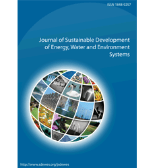
Journal of Sustainable Development of Energy Water and Environment Systems-JSDEWES
Empowering Research for a Sustainable TomorrowJournal of Sustainable Development of Energy Water and Environment Systems (JSDEWES), published by the International Centre for Sustainable Development of Energy, Water, and Environment Systems, is a premier Open Access journal that has been shaping the discourse surrounding sustainable energy, water management, and environmental systems since its inception in 2013. Based in Croatia, this esteemed journal, bearing the ISSN 1848-9257, emphasizes an interdisciplinary approach, making significant strides within its converged years from 2013 to 2024. With impressive rankings in 2023—Q3 in Energy Engineering and Power Technology, Q2 in Environmental Science (miscellaneous), and noteworthy positions in Renewable Energy, Sustainability and the Environment, and Water Science and Technology—JSDEWES showcases its commitment to advancing knowledge and innovation in crucial areas affecting our planet's sustainability. Designed for an audience of researchers, professionals, and students alike, this journal is pivotal in fostering research that enhances our understanding and implementation of sustainable practices, while its esteemed Scopus rankings further underline its impact and contribution to the field.
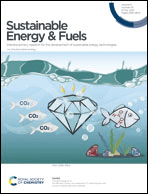
Sustainable Energy & Fuels
Exploring Innovative Pathways to Renewable EnergySustainable Energy & Fuels is a leading journal published by the Royal Society of Chemistry, dedicated to advancing knowledge in the fields of energy engineering, fuel technology, and renewable energy solutions. With its ISSN of 2398-4902 and notable Q1 status in both Energy Engineering and Power Technology as well as Fuel Technology, this journal ranks impressively in the Scopus database, ensuring a strong platform for disseminating impactful research. The journal spans a comprehensive scope aimed at addressing the global challenges of sustainable energy, including innovative methodologies and technologies that promote environmental sustainability. Although it operates under a traditional access model, the journal is committed to providing high-quality content that engages researchers, professionals, and students alike. With significant contributions expected through 2024, Sustainable Energy & Fuels stands at the forefront of facilitating scholarly communication, inspiring advancements in energy technologies that align with sustainability goals.

Carbon Energy
Exploring the future of renewable energy and materials science.Welcome to Carbon Energy, an esteemed open-access journal published by WILEY that focuses on cutting-edge research in the field of energy and materials science. Since its inception in 2019, this journal has quickly established itself as a leading platform for disseminating impactful findings and innovations related to carbon-based energy solutions, renewable resources, and sustainability practices. With its impressive Q1 rankings in multiple categories—including Energy (miscellaneous), Materials Chemistry, and Renewable Energy—Carbon Energy is recognized for delivering high-quality, peer-reviewed content that meets the rigorous standards of the academic community. Through its open-access model, the journal ensures wide accessibility of research findings, making it an invaluable resource for researchers, professionals, and students alike. As we look toward the future, Carbon Energy aims to further its mission of advancing sustainable energy technologies and promoting interdisciplinary collaboration in tackling global energy challenges.

Journal of the Japan Institute of Energy
Exploring the Frontiers of Energy Technology.Journal of the Japan Institute of Energy, ISSN 0916-8753, is a reputable academic journal dedicated to the field of energy studies, reflecting the dynamic and evolving landscape of energy research. Published by the Japan Institute of Energy, the journal serves as a platform for disseminating innovative research, technologies, and methodologies related to energy engineering, renewable energy sources, and sustainability practices. While this journal does not currently offer open access, it remains a vital resource for professionals, researchers, and students alike, particularly those focused on advancing knowledge within Energy Engineering and Power Technology, Fuel Technology, and related areas. As of 2023, it is ranked in the Q4 quartile across several categories in Scopus, which highlights its foundational role in fostering scholarly discourse, despite its lower ranking in the competitive global landscape. Established in 1990 and continuously evolving, the journal provides insights into the challenges and innovations in the energy sector, making it an essential read for anyone invested in the future of energy solutions.
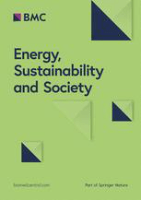
Energy Sustainability and Society
Shaping a sustainable tomorrow through open-access research.Energy Sustainability and Society is a leading open-access journal published by BMC, focusing on the critical intersections of energy sustainability and societal impacts. With an impressive Impact Factor and notable rankings—including Q1 in both Development and Energy Engineering, as well as Q2 in Renewable Energy, Sustainability, and the Environment—this journal serves as a pivotal platform for researchers, professionals, and students exploring innovative solutions to energy challenges. Since its inception in 2011, the journal has consistently provided high-quality research and insights, contributing significantly to the fields of energy policy, renewable technologies, and sustainable development. Access options are fully open-access, ensuring that research is freely available to foster collaboration and knowledge-sharing across disciplines. The journal’s commitment to publishing cutting-edge research underscores its importance in shaping a sustainable energy future.
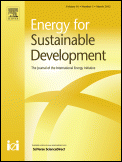
Energy for Sustainable Development
Empowering interdisciplinary dialogue on energy and development.Energy for Sustainable Development, published by Elsevier, is a leading interdisciplinary journal dedicated to advancing the academic discourse at the intersection of energy, sustainability, and development. With an impressive Q1 ranking in the fields of Geography, Planning and Development, and Management, Monitoring, Policy and Law, the journal stands out in the academic community for its rigorous peer-reviewed content that addresses crucial energy challenges and promotes innovative solutions. Since its inception, the journal has transitioned through various converged periods, reflecting on dynamic research trends from 1994 onwards. Notably, it boasts meaningful Scopus rankings, including a position in the top 10% of journals for Geography and Planning. Although it currently does not provide open access, the rich pool of research articles published here serves as a vital resource for researchers, professionals, and students committed to fostering sustainable development practices globally. As energy issues become increasingly pivotal in policy formulation and environmental considerations, Energy for Sustainable Development remains a crucial platform for disseminating impactful knowledge and fostering collaboration across disciplines.
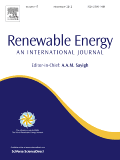
Renewable Energy
Transforming Ideas into Sustainable Solutions.Renewable Energy is a prestigious international journal published by PERGAMON-ELSEVIER SCIENCE LTD, dedicated to advancing the field of renewable energy technologies and their applications. Since its inception in 1991, this journal has provided a critical platform for researchers, professionals, and students to explore innovative solutions in renewable energy, sustainability, and environmental protection. With an impressive impact factor and ranked in the top quartile (Q1) of its category, Renewable Energy is recognized for its high-quality, peer-reviewed research that significantly contributes to the scientific and professional discourse in the sector. The journal is indexed in Scopus, holding an esteemed rank of #21 out of 270 in its field, underscoring its influence and reach. Researchers can access the journal’s articles through traditional subscriptions, ensuring a broad dissemination of vital knowledge that supports the global transition to sustainable energy sources. Addressed from its headquarters in Oxford, England, Renewable Energy is crucial for anyone involved in the journey towards a sustainable future, fostering collaboration and innovation in a critical area of environmental science.

Energy Storage
Advancing Sustainable Energy Through Storage TechnologiesEnergy Storage, published by WILEY, is a pivotal journal dedicated to the rapidly evolving field of energy storage technologies. Since its inception in 2019, the journal has established a significant platform for researchers and professionals by providing insightful articles that explore innovations and advancements in energy engineering and renewable energy systems. With an Impact Factor positioning it in the Q3 category for both Energy Engineering and Power Technology and Renewable Energy, Sustainability, and the Environment, Energy Storage plays a crucial role in disseminating knowledge that addresses global energy challenges. The journal is indexed in Scopus, showcasing its commitment to high-quality research, providing valuable contributions to the community including engaging studies and practical applications aimed at sustainable energy solutions. For those passionate about the future of energy, Energy Storage represents an essential resource for staying informed and connected within this dynamic and interdisciplinary field.

Materials Today Sustainability
Empowering research to drive eco-friendly innovations.Materials Today Sustainability is a leading journal in the interdisciplinary field of sustainable materials, published by ELSEVIER. With a strong commitment to advancing knowledge in sustainability and materials science, this journal encompasses a broad range of topics, including renewable energy innovations, sustainable engineering, and eco-friendly materials development. Achieving a prestigious Q1 ranking in 2023 across Chemistry (Miscellaneous), Materials Science (Miscellaneous), and Renewable Energy, this journal plays a crucial role in disseminating high-impact research that addresses global sustainability challenges. With an impressive Scopus ranking that positions it among the top journals in Chemistry, Materials Science, and Renewable Energy, Materials Today Sustainability is an invaluable resource for researchers, professionals, and students dedicated to driving forward the agenda of sustainability and material innovation. The journal is accessible through a robust open access model, ensuring the research reaches a global audience, facilitating collaboration and innovation in this critical field.

EcoMat
Empowering researchers with open access to transformative knowledge.EcoMat, published by WILEY, stands as a cornerstone in the interdisciplinary fields of Chemistry and Materials Science. Since its inception in 2019, this Open Access journal has quickly garnered a prestigious reputation, achieving Q1 category rankings across various fields, including miscellaneous chemistry and physical and theoretical chemistry. With Scopus rankings reflecting its impact—ranked #7 in both Physical and Theoretical Chemistry and Chemistry (miscellaneous)—EcoMat publishes cutting-edge research that addresses critical challenges in material sustainability and innovation. Researchers, professionals, and students alike benefit from the rich content accessible from its Hoboken, NJ location, exemplifying a commitment to enhancing scholarly communication and collaboration whilst advancing the frontiers of material sciences and chemistry.